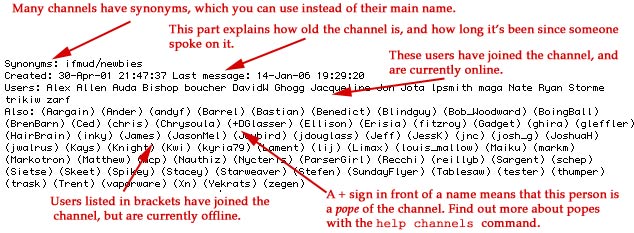The header of the last column is called the poll, and the entries beneath it are called doings. Every person on the MUD has their own doing, which is by default blank.
"Poll" is something of a misnomer. The original idea was that the poll would be a question, and everybody would put an answer to that question in their @doing. In practise, people tend to use both the poll and the @doing for silly phrases.
When the poll gets changed (which isn't very often) you'll see PollBoy hollering to tell everyone so. PollBoy isn't a real character on the mud, but a service that's provided so you can tell that someone has started a new poll.
To see what the new poll is, type in @poll to see the poll by itself, or who to see both the poll and the current @doings.
The @doing command will change your response. For example:@doing Nothing right now.will generate a response indicating that your @doing message has been changed. The response is random, and generally silly. To see that your @doing entry has taken effect, type in 'who' and look for your username.
(Your @doing message must be less than 53 characters, otherwise it gets truncated.)
If you like, you can change the poll. The @poll command was created so that anyone can start a poll. For example:
@poll Newbie plays with @poll command, film at eleven.The result will be that PollBoy will holler, "foobar has changed the poll!", and everyone will type in '@poll' to see what you wrote. (Don't do this too often, or people will get annoyed.)
Like @doing, @polls must be less than 53 characters or get truncated.
How do I see who's on a particular channel?
Again, you need to use the 'who' command, followed by the channel name:
If you want to see everybody on a channel, whether they're logged in or not, you need to use the @statc command:
If you type @statc on its own, you'll see the information on the last channel you used. If you type @listc -member you'll get the list of every channel you're on -- over time this can get quite big, so watch out!who #newbie
This will give you the 'who' list, but only for people on that channel. If you don't care how long people have been logged in, you can use the 'names' command:
names #newbie
which will give you a more compact version.@statc #newbie
